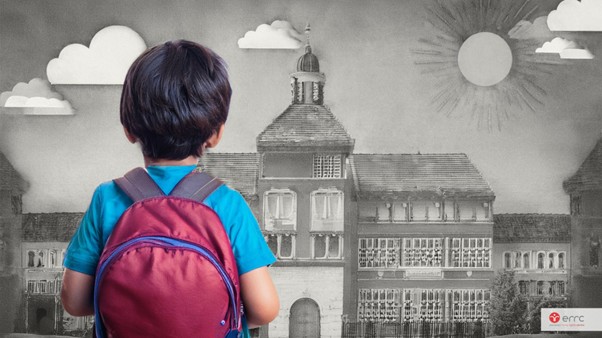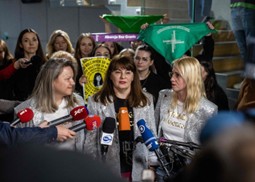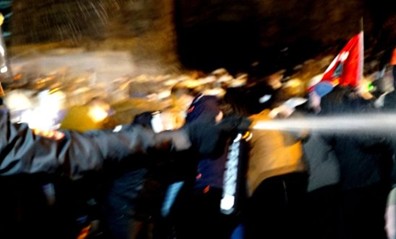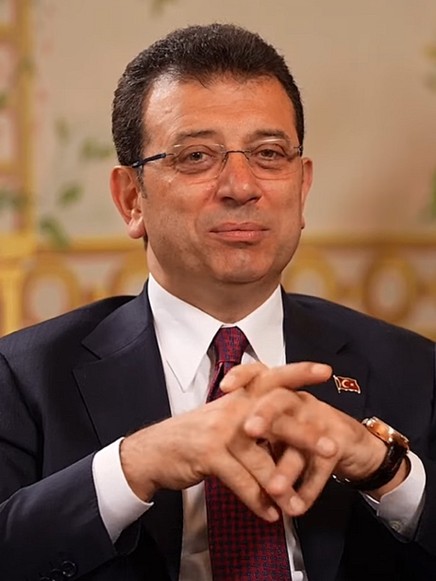Human Rights, Justice and Equality are under attack across Europe. This month it has been the Polish government suspending the right to asylum, Hungary further cracking down on LGBT communities by banning Pride, and brutal repression against people claiming the right to protest in Turkiye. The Mayor of Istanbul has been imprisoned. On 8th of April we celebrated International Roma Day, but just shortly after Amnesty and the European Roma Rights Centre released a new report on how discrimination in education persists in Slovakia, despite years of campaigning.
Hungary
Urgent Action Let Pride march in Hungary
Budapest Pride is under threat. A new law banning assemblies that support LGBTI rights is a direct attack on LGBTI people, their allies, and the right to protest. Pride is a peaceful demonstration of equality and justice. The Hungarian authorities must ensure LGBTI people can march freely and demand their rights peacefully, free from intimidation, harassment or violence.
Since 2010, Hungary has witnessed a marked deterioration in the rights and freedoms of its LGBTI community, largely driven by a series of laws and governmental actions aimed at limiting LGBTI visibility and expression. One of the most significant legislative moves was the introduction of the ‘Propaganda Law’ (Act LXXIX of 2021), which severely restricts the depiction of LGBTI identities in public life, including in educational materials, media, and advertisements.
The law was passed under the pretext of protecting children from content considered harmful to their “moral development.” However, its broad and vague language has resulted in far-reaching consequences, effectively banning content related to homosexuality, gender identity, and sexual reassignment. This has led to the widespread censorship of books, films, and other public resources featuring LGBTI themes, effectively removing LGBTI-inclusive materials from schools, bookstores, and public platforms.
These actions have severely limited access to information for both LGBTI individuals and the general public. The legal and societal crackdown initiated by this law has had devastating effects on the LGBTI community in Hungary, contributing to an atmosphere of fear and repression. Restrictions on public gatherings, the censorship of media and educational materials, and the stigmatization of LGBTI individuals have led to increasing isolation, discrimination, and violence against LGBTI people.
Please sign and share the petition !
https://www.amnesty.org/en/petition/let-pride-march-in-hungary/.
Slovakia
Romani Children Face Entrenched Discrimination As School Segregation Persists
 Bratislava, Brussels 16 April 2025: Ten years after the EU launched an infringement procedure against Slovakia for breaching the EU Race Equality Directive, Romani children still face entrenched discrimination in education. In a new report released today, Amnesty International and the European Roma Rights Centre (ERRC), condemn the “widespread and growing racial division in education”, and call on the Slovak government to take urgent and systemic action to end segregation in its schools.
Bratislava, Brussels 16 April 2025: Ten years after the EU launched an infringement procedure against Slovakia for breaching the EU Race Equality Directive, Romani children still face entrenched discrimination in education. In a new report released today, Amnesty International and the European Roma Rights Centre (ERRC), condemn the “widespread and growing racial division in education”, and call on the Slovak government to take urgent and systemic action to end segregation in its schools.
The briefing report, Separate & Unequal: School Segregation Persists for Roma in Slovakia, takes stock of legislative and policy responses following the European Commission’s referral of Slovakia to the European Court of Justice (ECJ) in April 2023 but finds these measures insufficient to address systemic practices of segregation. Legislative reforms, including amendments to the School Act, lack the enforceability and clarity needed to address entrenched disparities.
“Even though ten years have passed already since the infringement proceedings were initiated against Slovakia by the European Commission, we do not such see much of a change in segregation practices,” said the ERRC’s Legal Consultant, Michal Zálešák.
“The main reason is that the Slovak Government spent several years denying this was a systemic problem. While the willingness of the incumbent minister to take steps towards eradicating segregation is positive, we are concerned that most of the legislative changes adopted are not sufficiently effective to bring the desired change.”
“Our findings clearly show that we are not dealing here with accidental inequality. What we are witnessing, year after year, is a gradual attempt to legitimize a two-tiered education system—one for children born with full access to their right to education, and another for those burdened from the start with segregated, low-quality schooling,” said Rado Sloboda, Director of Amnesty International.
“This widespread segregation will not be undone by half-measures, symbolic reforms, or pilot projects. What’s needed is comprehensive and robust reform, targeted investment, and enforcement mechanisms that ensure real accountability.”
Severe disparities in educational outcomes persist, including significantly higher-grade repetition, lower standardised test scores, and elevated dropout rates compared to non-segregated schools. So-called “Roma schools” are disproportionately under-resourced, lacking basic facilities such as gyms and playgrounds. The report also confirmed the negative impact of two-shift schooling—a system almost exclusively applied to Romani children—which further limits their access to quality education. At the same time, funding and resources still flow to schools that continue to deliberately segregate and exclude.
Despite judicial rulings and repeated recommendations from European and international human rights bodies, segregation persists as a deeply rooted issue in Slovakia’s education system. A full decade has passed since the European Commission first launched infringement proceedings against Slovakia in April 2015, for its breach of EU rules on racial equality, which ‘strictly prohibit’ discrimination on grounds of ethnic origin.
In April 2023, the European Commission decided to refer Slovakia to the Court of Justice of the European Union for ‘failing to effectively tackle the issue of ethnic segregation of Romani children in schools.’ It noted that segregation had in fact increased since 2016, and that Slovakia was the EU Member State with the highest share of Roma segregation in education.
Ten years after the EU infringement the new report confirms that Slovakia’s education system persists in denying Romani children access to quality integrated education, and reveals how segregation is perpetuated by inadequate monitoring, infrastructural and academic inequities, and discriminatory practices. The report stresses the need for the European Commission to continue closely monitoring Slovakia’s compliance with the Race Equality Directive, and to take further enforcement actions where necessary.
At a national level, the report calls for bold, systemic reforms that go beyond symbolic legislation, robust monitoring, the allocation of targeted resources, and an explicit political commitment from the Slovak authorities to bring a final end to racial segregation.
Separate can never be equal. Slovakia must act now to end this abuse of fundamental rights, which not only denies Romani children the opportunities to succeed but ensnares future generations in poverty and social exclusion.
Poland
by Lucja Jastrzebska
Women’s Rights
Hope that decision to retry activist prosecuted for aiding an abortion gives hope that charges against Justyna can be withdrawn
 In 2020, Justyna Wydrzyńska – a doula and one of the founders of the Abortion Dream Team – supported a pregnant woman who said she had been suffering from domestic violence to access abortion pills.
In 2020, Justyna Wydrzyńska – a doula and one of the founders of the Abortion Dream Team – supported a pregnant woman who said she had been suffering from domestic violence to access abortion pills.
On 22 November 2021, she was charged with “helping with an abortion” and “possession of medicines without authorisation for the purpose of introducing them into the market”.
In March 2023, she was convicted of abetting an abortion and was sentenced to 8 months of community service.
However, following February’s Court of Appeal’s decision to refer the case of activist Justyna Wydrzyńska, Esther Major, Amnesty International’s Deputy Director for Research in Europe, stated that the composition of the judges in the first instance court meant that Justyna Wydrzyńska did not have a fair trial gives the Prosecutor’s office the opportunity to withdraw the charges against her.
Refugee Rights
Poland Temporarily Suspends The Right To Asylum
 Poland has temporarily suspended the right of migrants arriving in Poland via its border with Belarus to apply for asylum.
Poland has temporarily suspended the right of migrants arriving in Poland via its border with Belarus to apply for asylum.
Prime Minister Donald Tusk announced it would be happening after the controversial bill, which will allow Polish authorities to suspend this right for up to 60 days at a time, was signed into law by President Andrzej Duda.
Tusk had said it would be adopted “without a moment’s delay” while Duda said the changes were needed to strengthen security on the country’s borders.
But the law has been criticized by rights groups, including Human Rights Watch, which said the EU should take legal action against Poland if it were implemented as it violates international law such as the Refugee Convention and the European Convention of Human Rights.
Read more: https://www.bbc.co.uk/news/articles/c8719dl587zo
Türkiye
by Chris Ramsey
Protests in the aftermath of the detention and imprisonment of Istanbul Mayor Ekrem Imamoglu
 Since the detention and imprisonment of the Mayor of Istanbul Ekrem Imamoglu last month dealing with outcome of the mass protests and the wide ranging abuses by the law enforcement officials policing the protests has been the focus of Amnesty staff. They have been on the ground interviewing protesters and lawyers regarding allegations of unlawful use of force during the first week of the protests and attending ongoing protests that have largely been free of police intervention.
Since the detention and imprisonment of the Mayor of Istanbul Ekrem Imamoglu last month dealing with outcome of the mass protests and the wide ranging abuses by the law enforcement officials policing the protests has been the focus of Amnesty staff. They have been on the ground interviewing protesters and lawyers regarding allegations of unlawful use of force during the first week of the protests and attending ongoing protests that have largely been free of police intervention.

Officials have announced that almost 2,000 people have been taken into police custody and over 300 have been remanded in pre-trial detention, primarily for alleged breaches of the Law on Meetings and Demonstrations (namely failure to disperse, armed participation in a protest/concealing their identity with face coverings etc) with but also for ‘insulting the President’. So far nine indictments have been prepared and the first two hearings are set to take place on Friday 18 April. An individual who was remanded in pre-trial detention for sharing an image of ill-treatment of protesters, a photo initially shared but later deleted by a police officer on social media, has been already tried and convicted in one hearing, and sentenced to three years and nine months for ‘obtaining and sharing information unlawfully’.
Amnesty has been primarily focused on allegations of excessive/unlawful use of force, ill-treatment and possible torture, collecting testimonies from protesters and lawyers. IS staff are collaborating with colleagues from other human rights/legal rights organisations who are analysing footage collated by Amnesty Türkiye section colleagues. This will form the basis of further public statement to the Turkish authorities which will be accompanied by a press release – date of release to be confirmed. This will be circulated when it is available
Joint statement with 29 other legal and human rights organisations on the ongoing attacks on the Istanbul Bar Association.
In addition to the arrest of Ekrem Imamoglu the last few weeks have seen escalating attacks by Turkish authorities on the Istanbul Bar Association, its leadership, and members of the legal profession. The international legal and human rights community has condemned moves to undermine the independence of lawyers and the rule of law and initiated the following statement condemning the decision to remove the leadership of Istanbul Bar Association and the further criminal proceedings they are facing (see link below)
https://www.amnesty.org/en/documents/eur44/9264/2025/en/
Saturday Mothers/People – 30 years anniversary
As some of you will no doubt know, Saturday Mothers/People will mark 30 years of peaceful protest on 27 May this year. Although, as reported to you some weeks ago, the group was acquitted of the charges brought against it following the arrests in 2018 there are still restrictions on their ability to hold a weekly vigil in Istanbul.
Amnesty is in discussion with the group, in particular to relaunch the Urgent Action to open Galatasaray Square on the back of the acquittal of 45 people who had been prosecuted for their peaceful 700th vigil in August 2018, the date since which the Square has been blockaded. Please keep an eye open for the action which we hope to launch soon.
UN experts welcome Kurdish Workers’ Party ceasefire with Türkiye and urge a just and sustainable peace
GENEVA (11 April 2025) – UN experts* today welcomed the unilateral ceasefire declared by the Kurdistan Workers’ Party (PKK) on 1 March 2025, after more than 40 years of conflict with Türkiye.
“After so much bloodshed and insecurity, we urge the PKK and the Turkish Government to peacefully settle the conflict and respect applicable international humanitarian and human rights law,” the experts said.
The PKK has expressed its willingness to convene a party congress to pursue its dissolution and disarmament. It has conditioned these steps on a secure environment, a ceasefire by Türkiye, the creation of a legal mechanism for peace talks, and the release of its imprisoned leader. In the interim, the PKK has pledged to use force only in self-defence.
The Turkish President welcomed the unilateral ceasefire and insisted on the PKK’s immediate disarmament. Since the announcement, Türkiye has attacked alleged PKK targets and armed groups in Iraq and Syria it believes are affiliated with the PKK, raising concerns regarding the international prohibition on the use of force.
Kurdish forces in Syria have indicated that the PKK ceasefire does not apply to them.
“We urge Türkiye and the PKK to negotiate towards a durable and just peace, and to build confidence by committing to a ceasefire in order to protect civilians,” the experts said.
Over past decades, numerous temporary ceasefires have failed to resolve the conflict, which has involved grave violations of humanitarian law and human rights law. Violations include summary executions, targeting of civilians, enforced disappearances, torture, arbitrary detentions, forced displacements, conscription of child soldiers and restriction of political freedoms and minority rights. Civilians, including children and older persons, have been particularly affected.
“We encourage the parties to learn from successful peace settlements elsewhere,” the experts said. According to international standards, peace agreements should include:
- Disarmament,demobilisation, reintegration and amnesties or pardons for those who have not committed international crimes;
- Comprehensive transitional justice processes, such as truth telling, prompt, thorough,impartial, and transparent investigations, prosecutions, reparation for victims and guarantees of non-recurrence;
- Holistic measures to support victims of violations, including material assistance,protection, tracing of missing persons, repatriation of the deceased, and awareness-raising and memorialisation;
- Securitysector, institutional and governance reform to prevent abuses; and
- Comprehensivemeasures to address the root causes of violence to prevent the resumption of conflict.
The experts highlighted the good practices in the Secretary-General’s 2023 Guidance Note on Transitional Justice.
They also stressed that the United Nations Global Counter-Terrorism Strategy commits all countries to address the conditions conducive to terrorism, which may include “prolonged unresolved conflicts, dehumanization of victims of terrorism… lack of the rule of law and violations of human rights, ethnic, national and religious discrimination, political exclusion, socio-economic marginalization and lack of good governance”.
“We call on the international community to assist the parties to swiftly and conclusively resolve the conflict and effectively implement and sustain any peace agreement,” the experts said.
The experts have been in contact with Türkiye on several occasions in relation to the conflict with the PKK.